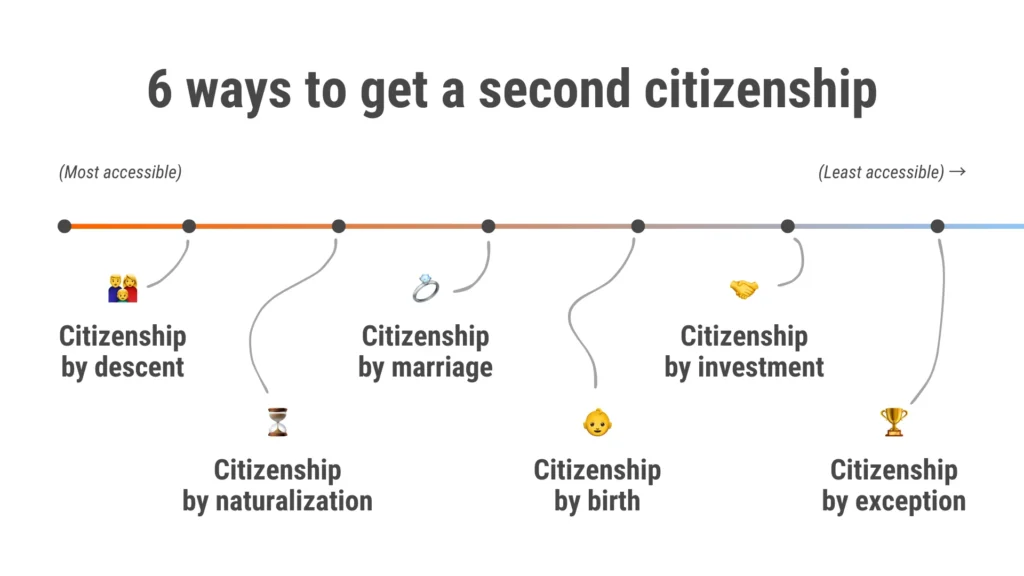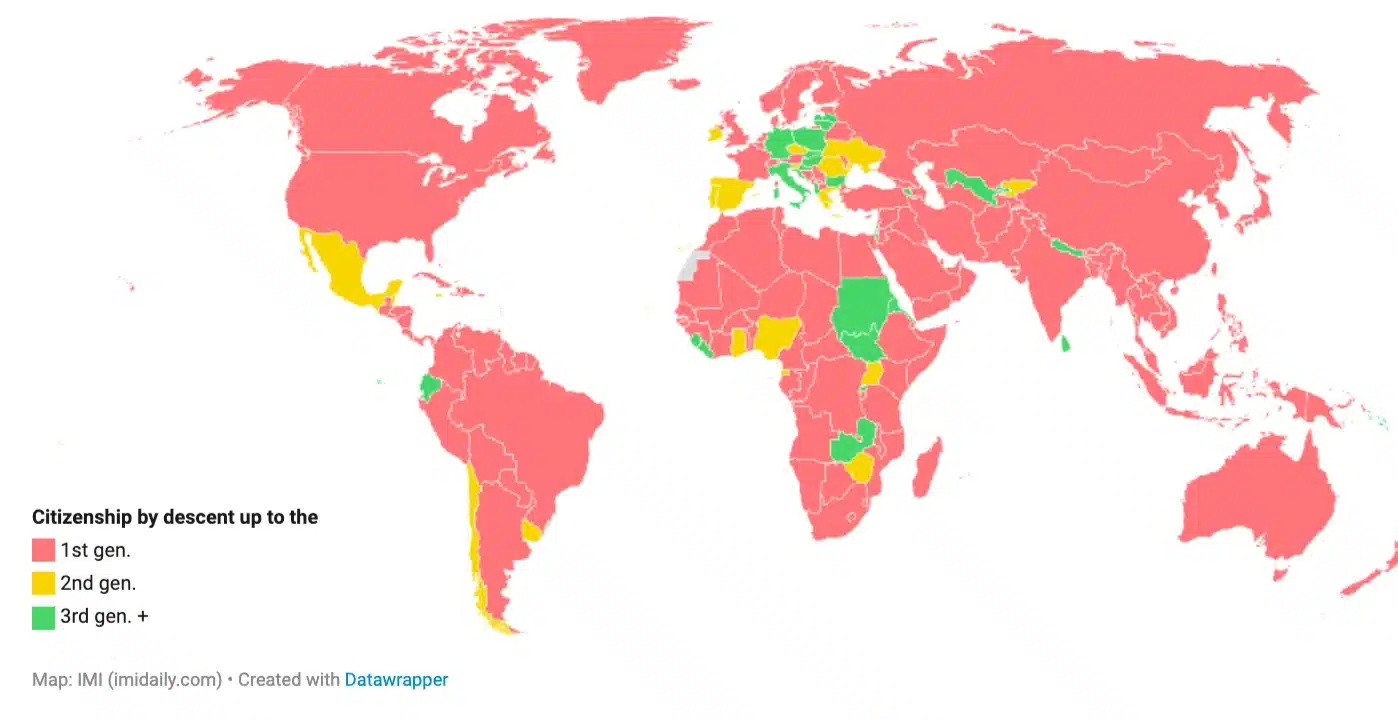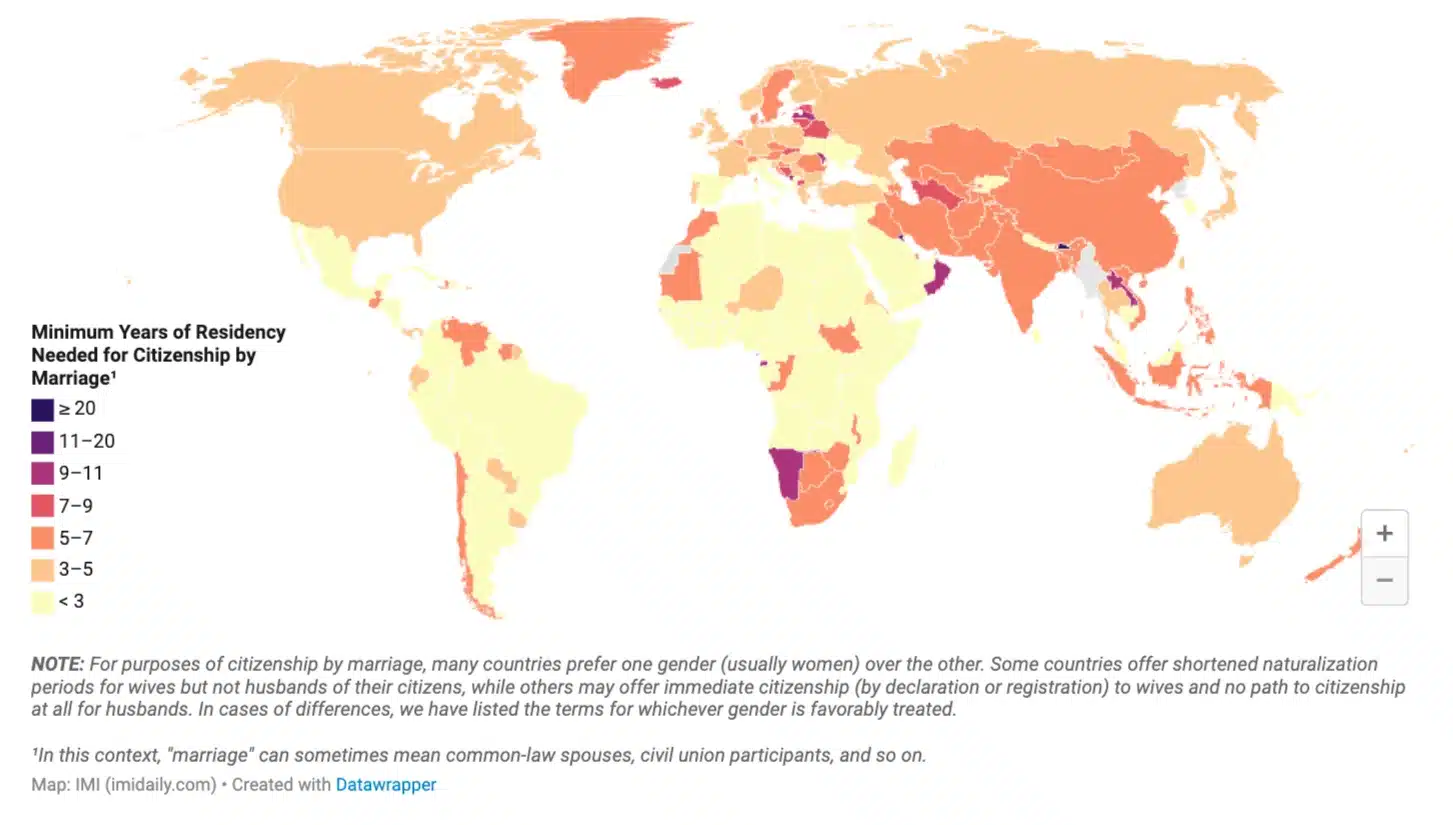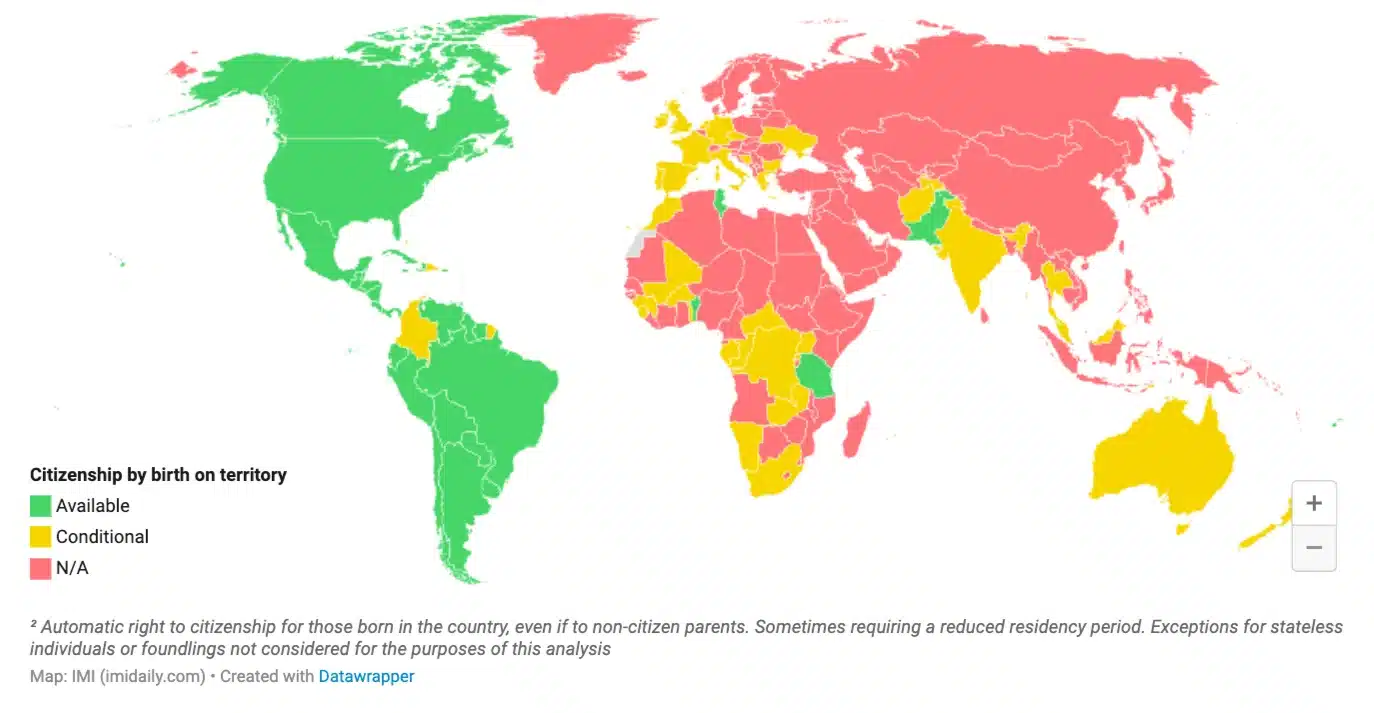Imagine a government, corporation, or any other malicious authority trying to stop you if you have three citizenships. Impossible!
I’m not condoning crime or proposing you commit one in order to test the boundaries of this theory 😅 But a passport portfolio allows you greater travel around the world, more privacy in investing and banking, and more optionality in case your country decides to go rogue.
The latter seems more likely every passing day.
So how can you, as a layman, get a second citizenship? Most think it’s difficult or reserved for the elites. I’m here to tell you they’re wrong.
Here are 6 ways to get another passport, ranging from the most to least accessible:

1) Citizenship by descent (ancestry)
If your parents, grandparents, or even great-grandparents were citizens of a foreign country, lucky you! You might be in line for a nearly-free citizenship yourself.
Some jurisdictions may reward you for having ancestors who were citizens of their country.
Citizenship by descent is the most straightforward way – and one of the fastest – to acquire another passport. Through your ancestry and family heritage, you may qualify for citizenship in a foreign country – no matter if you’ve physically been there.
What’s jus sanguinis? Right of blood. If you have ancestors from any of the following countries, you may qualify for citizenship in their birth country.

Why is citizenship by descent the most accessible? Essentially, all you must do is prove you’re the descendant of a citizen of their country (check your relevant government websites for specific rules and required documentation). In most cases, you don’t even need to speak the language or visit the country.
Well, you may have to pay lawyers and/or the government in question for general processing fees. But no significant investment or prohibitive “boots on the ground” (physical presence) is required for citizenship by descent.
So if you’re lucky enough to be the offspring of a citizen of a country that respects jus sanguinis law, take advantage of it before it’s too late 👍 This is an all-but free citizenship.
2) Citizenship by naturalization
Naturalization is probably the method of citizenship the layman is most familiar with.
Naturalization is simply meeting the presence or residency requirements over a certain period in a given country. Most commonly, this is how immigrants to your first-world home country get citizenship.
Once you’ve qualified for citizenship by meeting the residency requirements, you may have to take a history, language, or civics exam to officially become a citizen.
And it’s also worth noting that this residency period is just the time required to qualify. Processing may require another few years.
But once you’re naturalized, the country in question deems you a full citizen.
Very generally speaking, this is how many years countries in the following regions require for naturalization:
- 🌙 Middle East — Rare cases of naturalization
- 🐲 Asia — 10-∞ years (also rare)
- 🏰 Europe — 5-15 years
- ❄️ North America — 3-10 years
- 🌴 Latin America — 2-10 years
Last year, I invested in real estate and was granted residency in 🇨🇴 Colombia. Now, I’m on the path to citizenship in just a few years. That is, if I don’t get married to a Colombiana first 😉
I would also call this method of gaining citizenship “free,” but you often have to dedicate years of your time or in some cases – like here in Colombia – some capital in order to qualify for residency, then citizenship.
3) Citizenship by marriage
Marrying a citizen of another country can often speed up the citizenship process. Then, in almost all cases, you must also live in that country for a few years in order to then qualify for their citizenship.
In Brazil, for example, if you marry a Brazilian citizen, you can apply for naturalization in a reduced timeframe compared to other immigrants – sometimes in as little as one year following the marriage.
It goes without saying that, yes, this option often requires a real marriage and relationship. Most countries protect against fraudulent marriages (i.e. “green card marriages” in the United States) just to bypass immigration laws.

If you have a foreign spouse, take advantage of this law and become a citizen of his/her country if it pads your citizenship portfolio.
Here’s another “free” method of acquiring citizenship in a foreign country. You just have to pay processing and legal fees and devote your time if that government requires physical presence before officially becoming a citizen.
4) Citizenship by birth
Many countries (almost exclusively in the Western Hemisphere) incentivize foreigners to birth their children on their soil. In return, children receive birthright citizenship. And in some cases, the parents may receive residency or citizenship as well.
Nice 👍
Of course, “birth tourism,” as it’s called, is not that simple. Some countries require physical presence for a certain time period before or after the birth in order to receive its benefits. But nevertheless…
Some of the most popular birth tourism countries in the Americas are:
- 🇨🇦 Canada
- 🇺🇸 USA
- 🇲🇽 Mexico
- 🇨🇷 Costa Rica
- 🇨🇱 Chile
- 🇧🇷 Brazil
- 🇦🇷 Argentina

Check out this 1-minute video for a glimpse into how Shannen Michaela gave birth in Costa Rica, got citizenship for her baby, and started her path toward citizenship in the Central American country.
I would call birth tourism another free method of acquiring citizenship. But you will have to pay hospital bills and in some cases, more legal and processing fees than in other methods.
5) Citizenship by investment
An increasing number of countries grant citizenship to individuals who invest in their jurisdiction and contribute to their economic growth.
The first country to create a citizenship by investment program was Caribbean island 🇰🇳 St. Kitts and Nevis in 1984. Since then, almost 25 countries have introduced programs.
Today, the most popular countries that may grant you citizenship upon your investment (minimum thresholds vary) in their country are:
- Caribbean
- 🇦🇬 Antigua & Barbuda
- 🇩🇲 Dominica
- 🇬🇩 Grenada
- 🇰🇳 St. Kitts & Nevis
- 🇱🇨 St. Lucia
- Europe
- 🇲🇹 Malta
- 🇹🇷 Turkey
- Asia
- 🇯🇴 Jordan
- Africa
- 🇪🇬 Egypt
(Again, these are just the most popular programs. There are several more.)
How much do you think citizenship in these countries costs? Well, prices vary, of course.
But some Caribbean countries offer citizenship for investments as low as $100,000 – less than half than what you’d invest in a new house in North America! Is it worth it?
🇲🇹 Malta is the most expensive popular program, with costs ranging up to €1 million (about $1 million USD).
But if you’re looking for the fastest path to citizenship, investment and descent are your best options.
6) Citizenship by exception
70% of countries grant citizenship to exceptional individuals to reward their talents or contributions to the world or their country. 70%!
However, you must be top 1% of the top 1% in your field.
One famous example of a citizenship by exception case is Peter Thiel, one of the founders of PayPal and Palantir. He acquired citizenship in 🇳🇿 New Zealand by exception despite spending only 12 days in the country across a few years vs. the 1,350 days normally required for naturalization.
But that’s the power of exception 🤷♂️ A free citizenship for being incredible at your craft.
A warning here though – Citizenship by exception has also been an excuse for many to “buy” or “receive” passports * through corrupt backchannels. This is illegal and can land you in a world of trouble when a government realizes you’re not a real citizen. Avoid!
* Citizenship ≠ Passport. What you want is an irrevocable (but renounce-able) citizenship, with which you can then obtain a passport. If you just receive a passport from a country, instead of full citizen rights, it’s likely illegal.

If you’re aiming to get a second citizenship and diversify your nationality stack, what’s your preferred method?
Email or DM below 👇


